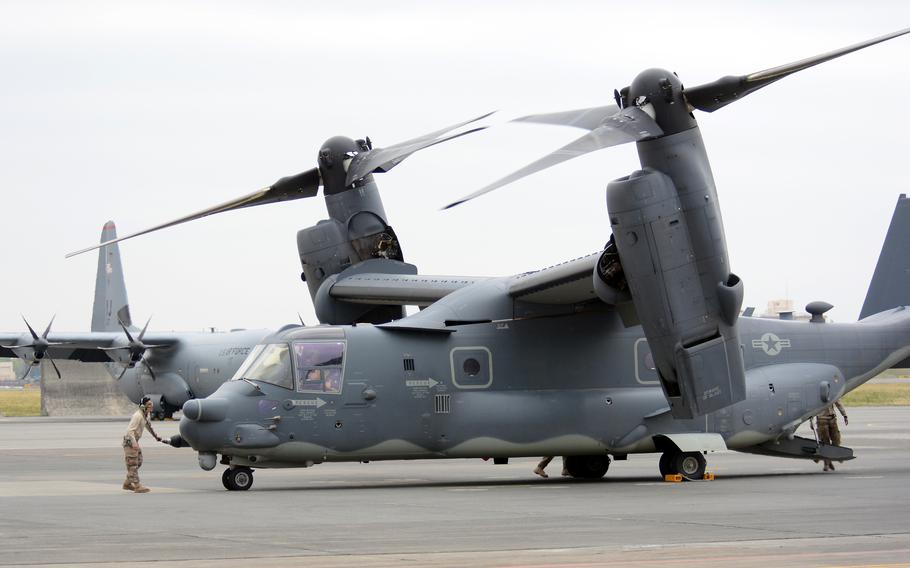
An Air Force CV-22B Osprey arrives at Yokota Air Base, Japan, in April 2018. (Stars and Stripes)
Three members of Congress from Massachusetts asked the Pentagon this week to ground the V-22 Osprey until the cause behind a series of fatal accidents is identified and permanent fixes are put in place.
Democratic Sens. Elizabeth Warren, Ed Markey and Rep. Richard Neal wrote Thursday to Defense Secretary Lloyd Austin about their concerns over the resumption of tiltrotor flights in March after a three-month ban.
The Osprey’s Joint Program Office, which oversees the V-22’s development and operations, has yet to verify the “the ultimate root cause of accidents that have killed or injured dozens of service members,” according to the lawmakers’ letter.
“The Department of Defense should be making service members’ safety a top priority,” the three wrote.
The V-22 has a “turbulent safety record,” the letter states. Since its introduction in 2007, Osprey accidents have killed 64 service members and injured 93.
In the past two years, four accidents have killed 20 service members, among them two Massachusetts natives: Marine Corps Capt. Ross Reynolds in 2022 in Norway, and Air Force Staff Sgt. Jacob Galliher, one of eight who died when an Osprey crashed Nov. 29 off southern Japan.
The U.S. military grounded 400 Ospreys between Dec. 6 and March 8 while it investigated the November crash.
The Marines on Okinawa resumed MV-22 Osprey flights on March 14. The Japan Ground Self-Defense Force resumed flying its Osprey fleet a week later.
Air Force Special Operations Command in Japan, whose Osprey crashed in November, did not fly again until July 3.
The lawmakers’ letter asks whether Osprey manufacturers Bell Textron and Boeing have provided the documentation needed for a full review of the V-22 safety problems.
They also asked whether the results of any review of the Osprey will be made public and what Japan has done to restrict its Osprey flights. That country’s military has not experienced the same safety issues with its tiltrotors that the U.S. has, the letter states.
The lawmakers asked for a response to those and other questions by Aug. 1.
Adm. Carl Chebi of U.S. Naval Air Systems Command said during a congressional committee hearing on June 12 that the aircraft has not been deemed entirely safe, according to the letter. The Osprey, though returned to flight status, is not cleared for its full range of missions, Chebi said at the time.
Chebi said he would not return the Osprey to unrestricted operations until his command has addressed the aircraft’s safety issues. He said a “holistic” review of training, maintenance and operations of the V-22 is expected to take another six to nine months to complete.